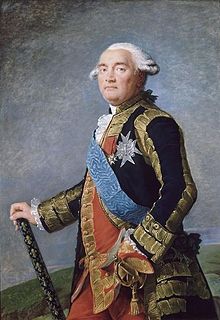Philippe-Henri de Ségur
Philippe Henri, marquis de Ségur-Ponchat ( January 20, 1724 - October 8, 1801 ) was a French marshal and minister of war.
He was the only son of Count Henri-François de Ségur (1689–1751) from the family of the Counts of Ségur and Angélique de Froissy (1702–1785), natural (illegitimate) daughter of Philippe II. De Bourbon, duc d ' Orléans , who officially recognized it four years later
Military career
In 1739 he entered the Régiment de Rosen cavalerie as a cornet , in which he later also became captain . On August 22, 1743 he took over command of the de Vexin infantry regiment as a Colonel en second and on December 1 that of the Soissonnais infantry regiment . In this post he was under his father's command in Italy and Bohemia . In 1746 he was wounded in the Battle of Roucoux and the following year lost an arm in the Battle of Lauffeldt . On July 27, 1747 he was promoted to Brigadier des armées du roi .
On March 23, 1748 he followed his father as Lieutenant General in Champangne and Brie. On August 25, 1749, he was promoted to Maréchal de camp . In 1753 Ségur was appointed governor of the County of Foix .
During the Seven Years' War he led a command in the Battle of Hastenbeck , the Battle of Krefeld and the Battle of Minden . On May 25, 1758 he was appointed Inspector General and on May 18, 1760 Lieutenant-General of the Infantry. In the battle of Kampen Abbey in October 1760 he was taken prisoner of war.
On June 7, 1767 he was accepted into the Ordre du Saint-Esprit . In 1775 he was appointed governor of Franche-Comté and on December 25, 1780, he was appointed Secretary of State for War (Secrétaire d'État à la Guerre - de facto Minister of War). In 1783 he introduced the permanent general staff and, for the time, issued remarkable regulations concerning barracks and military hospitals. He was responsible for a decree - called "Édit de Ségur", which reserved the officer positions for the nobility but was never enforced.
On June 13, 1783 he was appointed Marshal of France and on August 29, 1787, he gave up his post as Secretary of State for War.
During the reign of terror of the French Revolution , he was incarcerated in the Prison de la Force . After his release, his entire property was confiscated and he lived in great poverty from then on.
Napoléon Bonaparte granted him a pension in 1800. De Ségur died the following year.
literature
- Pierre de Ségur, Le Maréchal de Ségur, 1724-1801 , Paris 1895.
- Michel Popoff & Hervé Pinoteau Armorial de l ' Ordre du Saint-Esprit - d'après l'œuvre du père Anselme et ses continuateurs Éditeur: Le Léopard d'or, Paris 1996, ISBN 2-86377-140-X .
| predecessor | Office | successor |
|---|---|---|
| Alexandre-Marie-Léonor de Saint-Mauris de Montbarrey |
Minister of War of France December 23, 1780 - August 29, 1787 |
Louis-Charles-Auguste le Tonnelier, Baron de Breteuil |
| personal data | |
|---|---|
| SURNAME | Ségur, Philippe-Henri de |
| ALTERNATIVE NAMES | Ségur, Philippe Henri de |
| BRIEF DESCRIPTION | French military commander and statesman; (1780–1787) Minister of War; since 1783 Marshal of France |
| DATE OF BIRTH | January 20, 1724 |
| DATE OF DEATH | October 8, 1801 |
